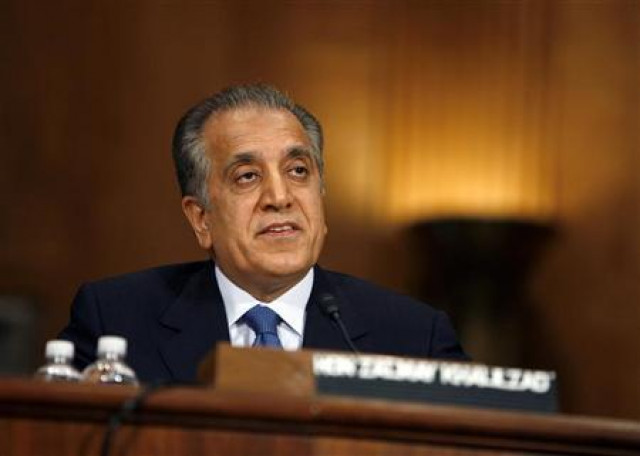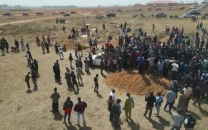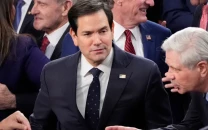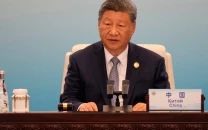Khalilzad terms Doha talks with Taliban ‘productive’
US representative for Afghanistan reconciliation vows to take ‘slow and steady steps’ toward peace in Afghanistan

United States Special Envoy for Afghanistan Zalmay Khalilzad. PHOTO: REUTERS
Khalilzad took to the Twitter on Thursday and vowed “to take slow, steady steps” toward peace.
(1/3) Emerging from three solid days of talks with the Taliban in #Doha. Meetings were productive. We continue to take slow, steady steps toward understanding and eventually #peace.
— U.S. Special Representative Zalmay Khalilzad (@US4AfghanPeace) February 28, 2019
(2/3) Both sides will take the next two days for internal deliberations, with plans to regroup on Saturday. All four key issues remain on the table.
— U.S. Special Representative Zalmay Khalilzad (@US4AfghanPeace) February 28, 2019
The US envoy continued that there was also progress on forming a national team in Kabul ready to engage in intra-Afghan talks with the Taliban.
(3/3) As talks continue in Doha, there is also progress on forming a national team in #Kabul ready to engage in intra-Afghan dialogue and talks with the Taliban.
— U.S. Special Representative Zalmay Khalilzad (@US4AfghanPeace) February 28, 2019
US and Taliban officials, looking to end a 17-year war in Afghanistan, began their most detailed and high-level discussions yet on foreign troop withdrawals and counter-terrorism on Tuesday.
The talks are seen as the most promising yet between the warring parties after the Taliban’s newly-appointed political chief Mullah Abdul Ghani Baradar joined for the first time.
US, Taliban talk troop withdrawal, counter-terrorism at peace talks
The two sides are looking to hammer out a timeline and logistics for a potential troop withdrawal, as well as guarantees that the Taliban will not host militant groups as the US winds down its presence, sources close to the talks said.
Some 14,000 US troops are based in Afghanistan as part of a US-led Nato mission to train, assist and advise Afghan forces. Some US forces also carry out counter-terrorism operations.
US military officials have been brought in to join this week’s talks in Doha, another official said, raising hopes for progress after the last round in January secured a broad framework agreement but few details on critical aspects of a ceasefire and withdrawal.
President Donald Trump told Congress this month he intended to reduce US forces from Afghanistan as negotiators make progress in talks with Taliban insurgents, saying, “Great nations do not fight endless wars.”
The US team, led by Khalilzad, is also pushing for the Taliban to meet with the Afghan government, which the group has so far snubbed, and to agree on a ceasefire ahead of its annual spring offensive, sources said.
US, Taliban resume Afghan peace talks before spring fighting season
Supporters of the Afghan government worry Washington could negotiate an abrupt pull-out in their absence, leaving communities that opposed the Taliban in danger and imperilling reforms such as the education of girls which the Taliban banned.
Qatar, which has hosted a political office for the Taliban since 2013, has looked to present itself as a critical staging ground and mediator for the talks.
The first meeting on Monday between Khalilzad and Baradar appeared to be “formal, and yet very cordial,” a third source close to the talks said.



















COMMENTS
Comments are moderated and generally will be posted if they are on-topic and not abusive.
For more information, please see our Comments FAQ